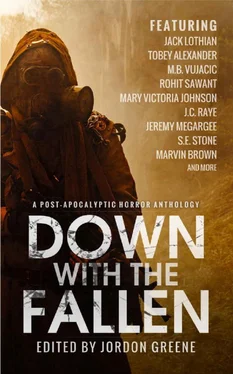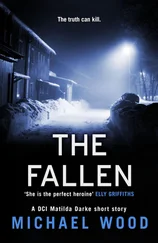Gloria speaks up. “I’m glad those children will have a place to live, but I wonder where the brown buses went?”
Thomas never takes his eyes from the TV. “Who cares,” he snaps at his wife.
I bite my lip and stay silent, but I care very much where those homeless seniors went.
After a commercial touting a miracle cure for sleep disorders, Patti Snow returns.
“This news should be encouraging to our seniors. The Mohave Sanctuary was completed yesterday. Here is video of our nation’s 180th self-sufficient site.”
Mohave Sanctuary looks like a five-story stone swastika rising from the desert floor. We see an aerial view of smaller multi-shaped buildings surrounding the main building, scattered Joshua trees, and a vast windmill farm.
“Now that is one hell of a building!” Thomas says.
Patti continues:
“Remember to guard your monthly gas and food rationing cards. If lost, they will no longer be replaced.
“We care about our faithful viewers and remind you that the government-mandated eight p.m. curfew is for your safety. Stay well, and I’ll see you tomorrow night.”
* * *
On Wednesday evening, before we’re done eating, Thomas makes the announcement. “I got the promotion! Starting next Monday I’ll be working from home. Won’t that be great, kids?”
While the children cheer, my mouth goes so dry the pasta I’m chewing tastes like cardboard.
* * *
Gloria put the kids to bed early while I cleared the table and washed dishes. After losing their beautiful home in South Pasadena three years ago when the stock market plunged to mid-earth, they were lucky to rent this 800-square-foot house in Monrovia. No dishwasher, but I don’t mind hand-washing dishes and letting God tend to their drying.
Gloria and Thomas brush past me and walk out to their small back yard. The kitchen window is open so I can’t help but hear their conversation.
“Next Monday, Thomas? That’s fast. Maybe now I can use the car sometimes.”
“Gloria, I’ll still need the car to make personal collections .”
“What about my mom? Now that Amy’s in school and you’ll be working from home—”
“Exactly! She’s useless now, isn’t she?” Thomas lowers his voice. “Besides, Steven’s going to nominate me for President of our Chapter at the next NIOT meeting. How will it look for me if I have Deadwood living in my own home?”
“Tell me you did not report her to—”
“Last week. I called them last week. It’s done, Gloria.”
Thomas strides past me, Gloria in his wake. I hear their bedroom door slam and muffled tense voices as I rinse and rack the last pan.
* * *
Thursday afternoon Gloria comes home from work early so we can walk the children to the local thrift store for school clothes. Thomas is waiting for us when we return. I’m barely in the door when he hands me a government-issued neon yellow envelope.
“They needed a signature so I signed for you. You probably should open it right away,” Thomas tells me.
I read the two-page letter and stare at it for a few seconds.
“What does it say, Jill?” Thomas asks.
Ignoring her husband, I tell Gloria, “It’s my Relocation letter. I’m assigned to Mohave Sanctuary.”
“When?” they both ask.
“Eleven o’clock tomorrow night.”
“But that’s only one day, Mom,” my daughter says while glaring at Thomas.
“There’s also an instruction sheet.” I fold the pages and shove them back in the yellow envelope. “And it doesn’t take long to pack one suitcase.”
“Old suitcases are in the garage. I’ll go get one for you,” Thomas offers.
“Why are you leaving, Grandma?” Mark lisps through his missing baby teeth.
“Grandma won a long vacation. Isn’t that exciting?” Thomas tells my grandchildren before dashing out the front door toward the garage.
“Where are you going?” Joel shouts as all three children jump around with excitement.
“To a big hotel in the desert,” I lie.
* * *
Friday morning I scrub the dingy suitcase Thomas found in the garage and clean the house. By noon, my daughter’s home is spotless, so I treat myself to a long hot bath before packing.
First, I stuff in all the recommended clothes and hygiene items. Then I go through my photos and select the ones that truly touch my heart. I pack some books, my journal, two pens, and I’m done.
Gloria comes into Amy’s tiny room. I hand my daughter a shoe box containing the few things of value I still have.
“The jewelry is for you and Amy, and these old silver dollars are for the boys to share. The big box stored in your garage is filled with photo albums. I wish I had more to leave you, Gloria.”
Tears fill my daughter’s eyes so I hold her close and whisper, “If you hadn’t taken me in eighteen months ago, honey, I would have been out on the streets then. This time with you and the children has been a blessing. Please don’t cry.”
We have our favorite dinner that night—spaghetti tacos. We keep it festive for the children. I pretend to be looking forward to my vacation in the desert. No tears, only smiles and laughter. I give each grandchild special hugs and kisses at bedtime. I can’t let them see or know that my heart is breaking.
Thomas went to bed an hour ago. Gloria is in the kitchen fixing us another cup of tea.
I’ve never been a very brave or adventurous person, and now I’m so terrified I can hardly breathe. My eyes keep drifting to the suitcase by the door.
My daughter sits beside me and holds my hand. “Remember the time I lost my cuddle blanket and cried for days, Mom? That was nothing compared to this.”
“I love you so much, Gloria, but we need to say goodnight. If you go to bed now, this will be easier for me.”
Ten minutes before my assigned pick-up time, I slip into a jacket, wheel my suitcase out onto the porch, and lock the door behind me.
Darkness surrounds me as I stare up at the waning moon and listen for the whisper of dry leaves rustling across asphalt.
Heathfolk
Mary Victoria Johnson
“Shame. We could’ve been good friends, you and I,” sighs Jack. “They say it’s better when you’re not alone. Oh well. Too late now.”
Her voice is muffled by the ill-fitting gasmask, but it won’t make any difference to her companion. A wild pony, covered with a shaggy winter coat, lies keeled at her feet. A good portion of its throat is missing. The blood hasn’t yet dried—had she been mere minutes earlier, Jack might have caught the pony alive.
She straightens and scans the moor. Dust makes it impossible to see more than a few miles, settling into the valleys like a heavy sea fog, and caressing the empty expanse of gorse, heather, and bracken that swallows the hills. Nothing breaks the ringing silence. Aside from the corpse, Jack decides she is alone.
Although leaving the pony to rot feels wasteful, she’s never been good at butchering, even with small hares and pheasants. And looking into its shining, black-marble eyes, Jack can’t shake the memory of feeding herds of Dartmoor ponies apples as a child—they’d come right up to her garden fence, inquisitive and unafraid, lingering for hours.
So, she leaves.
Besides, the responsible predator is probably diseased. The heath doesn’t hold much food anymore, and only madness would cause an animal to risk taking down the area’s largest inhabitant for nothing.
Of course, there aren’t any predators left. No foxes, no wild dogs. She tries not to think about it.
Walking back to her cottage, Jack fiddles with her gasmask. It belonged to her grandfather, a relic from last century’s war, and doesn’t stop the chemical smell of Dust from reaching her nose, but it’s better than nothing. It’s kept her alive this long, after all.
Читать дальше












